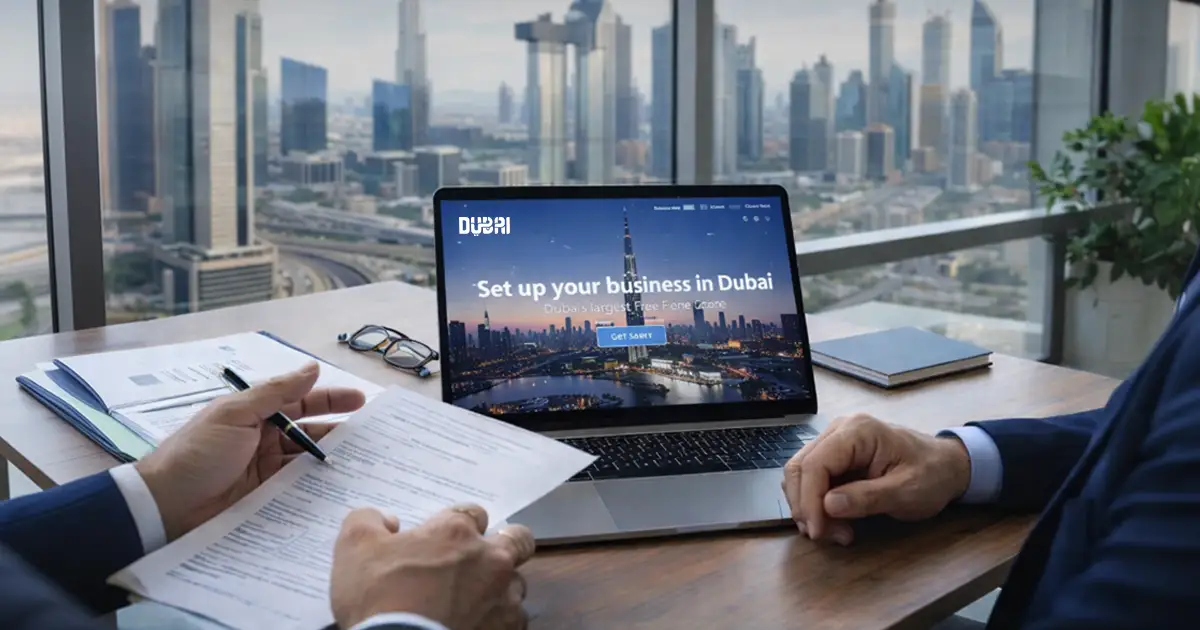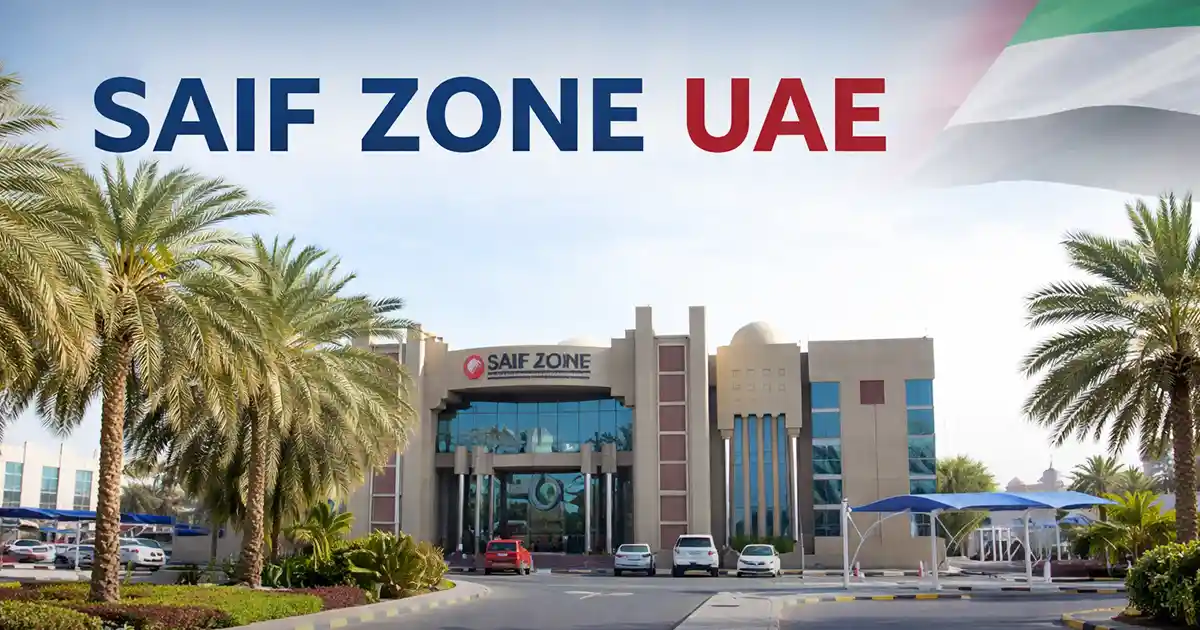Major Free Zones in Dubai
Choosing the right free zone depends on your business activity, size, and expansion plans. Below is a detailed look at some of the most prominent free zones in Dubai, highlighting their key features, costs, and special advantages
-
Dubai Multi Commodities Centre (DMCC)
DMCC is one of the world’s largest commodities trading hubs, specializing in gold, diamonds, energy, and other global commodities. It is known for its strong infrastructure, networking ecosystem, and flexible licensing. Establishing a business in DMCC is ideal for trading companies seeking a prestigious Dubai address, as it supports virtual offices and dual licensing.
In the first half of 2025, DMCC welcomed over 1,100 new companies, marking a significant increase in international investment. Notably, company registrations from the United Kingdom rose by over 23% year-on-year, bringing the total number of British companies in the district to nearly 2,200. Similarly, Türkiye recorded robust growth, with a 22% year-on-year increase, and close to 700 Turkish companies now operate within DMCC.
| Feature | Details |
|---|---|
| Primary Industry | Commodities, Trading |
| Key Advantages | Global trading hub, 100% foreign ownership, strong ecosystem |
| Location/Connectivity | Jumeirah Lake Towers, central Dubai |
| Typical Cost Range / Minimums | AED 20,000+ per year |
| Special Features | Supports virtual offices, dual licensing, and sector-specific commodities focus |
With its thriving trade ecosystem, DMCC remains the go-to choice for global traders looking to expand their footprint in Dubai’s dynamic economy.
Read more: DMCC License Cost
2. Jebel AIi Free Zone (JAFZA)
Established in 1985, JAFZA is a premier logistics and industrial hub, strategically located near Jebel Ali Port and Dubai International Airport. It caters to a diverse range of industries, including manufacturing, logistics, and trading. Check out the activity list for JAFZA Free Zone from this blog- JAFZA Activity List for Businesses.
In May 2025, JAFZA celebrated its 40th anniversary with record-breaking trade volumes of AED 697.3 billion over the past year, underscoring its pivotal role in global trade. Additionally, India’s leading electric vehicle manufacturer, Omega Seiki Mobility, invested AED 91.75 million to establish an electric vehicle assembly plant within JAFZA. This highlights the zone’s appeal to clean mobility solutions.
| Feature | Details |
|---|---|
| Primary Industries | Logistics, Manufacturing, Trading |
| Key Advantages | Port access, industrial infrastructure, flexible licensing |
| Location/Connectivity | Jebel Ali, near the port & airport |
| Typical Cost Range/Minimums | AED 15,000+ per year |
| Special Features | Warehouse space, dual licensing, industrial-friendly |
Moreover, as you move from trade to manufacturing, JAFZA stands as a cornerstone for industrial and logistics excellence in the region.
3. Dubai Internet City (DIC)
Established in 2000, DIC is a leading tech and innovation hub, fostering a collaborative environment for IT companies, startups, and digital enterprises. It provides state-of-the-art facilities and a vibrant ecosystem for technological advancement.
In April 2025, DIC showcased its commitment to technological innovation by participating in GITEX Asia, held in Singapore, to highlight its role in shaping the future of technology and innovation in the Middle East.
| Feature | Details |
|---|---|
| Primary Industries | Information Technology, Digital Media |
| Key Advantages | Tech infrastructure, innovation ecosystem, networking |
| Location/Connectivity | Dubai Silicon Oasis area |
| Typical Cost Range/Minimums | AED 15,000+ per year |
| Special Features | Virtual office available, startup-friendly, tech incubators |
If you’re venturing into the tech space, DIC offers the perfect platform to innovate and grow within Dubai’s digital ecosystem.
4. Dubai Media City (DMC)
DMC, established in 2002, is a premier media and creative industries hub that offers a dynamic environment for media professionals, content creators, and advertising agencies. Setting up a business in Dubai Media City (DMC) provides world-class infrastructure and a collaborative community.
Additionally, in May 2025, DMC hosted the Dubai Lynx Awards, celebrating excellence in creative communications across the region.
| Feature | Details |
|---|---|
| Primary Industries | Media, Advertising, Creative |
| Key Advantages | Creative ecosystem, networking, coworking spaces |
| Location/Connectivity | Barsha Heights |
| Typical Cost Range/Minimums | AED 15,000+ per year |
| Special Features | Virtual office options, sector-specific licenses |
For businesses shaping the region’s creative future, DMC offers unmatched opportunities to collaborate, create, and connect.
5. Dubai Silicon Oasis (DSO)
Set up in 2004, DSO is a technology park that supports innovation and entrepreneurship in the fields of electronics, microelectronics, and IT. It offers integrated living and working spaces for tech companies and startups.
In January 2025, Dubai Silicon Oasis (DSO) was recognized as the “Data Centre of the Month” for its significant growth in data centre infrastructure. It houses four operational data centres with a fifth under construction, slated for completion by the end of 2025.
| Feature | Details |
|---|---|
| Primary Industries | Technology, Electronics, Microelectronics |
| Key Advantages | Tech infrastructure, integrated living, innovation support |
| Location/Connectivity | Dubai Silicon Oasis |
| Typical Cost Range/Minimums | AED 20,000+ per year |
| Special Features | Data centre infrastructure, startup-friendly |
Furthermore, DSO continues to attract tech-driven startups and innovators seeking a smart city environment built for the future.
Realted guide: Dubai Silicon Oasis (DSO) Free Zone: Advantages Business Setup Guide
6. Dubai International Financial Center (DIFC)
Established in 2004, the Dubai International Financial Centre (DIFC) is a leading global financial hub strategically located in the heart of Dubai. Spanning 110 hectares, DIFC serves as a bridge connecting the Middle East, Africa, and South Asia (MEASA) region with global markets. It provides a platform for financial institutions, professional services firms, and innovative startups to operate within a world-class regulatory environment.
In the first half of 2025, DIFC experienced a 32% increase in company registrations, adding 1,081 new firms, including asset managers, hedge funds, and family offices. This growth brought the total number of active companies within the financial hub to 7,700, marking a 25% increase compared to the previous year.
| Features | Details |
|---|---|
| Primary Industries | Banking, Financial Services, Wealth & Asset Management, FinTech, Legal Services |
| Key Advantages | 100% foreign ownership, 50-year tax holiday, English common law framework |
| Location/Connectivity | Central Dubai, close to major transportation hubs |
| Typical Cost Range/Minimums | AED 30,000+ per year |
| Special Features | DIFC Courts, Dubai Financial Services Authority (DFSA) regulation, Gate Avenue retail and dining precinct |
For enterprises focused on finance and investment, DIFC represents the heart of Dubai’s global financial landscape.
7. Dubai South
Dubai South is a strategic urban development focusing on aviation, logistics, and residential communities. Established in 2006, it encompasses the Mohammed bin Rashid Aerospace Hub and Al Maktoum International Airport.
In September 2025, Dubai South reported a 15% growth in business aviation movements, with 9,753 private jet movements recorded in the first half of 2025. This reaffirms Al Maktoum International Airport’s position as the leading airport for international business aviation movements in the Middle East.
| Feature | Details |
|---|---|
| Primary Industries | Aviation, Logistics, Residential |
| Key Advantages | Airport proximity, integrated community, infrastructure |
| Location/Connectivity | Al Maktoum International Airport |
| Typical Cost Range/Minimums | AED 25,000+ per year |
| Special Features | Dual licensing, integrated urban development |
As Dubai’s gateway to global trade and aviation, Dubai South is where connectivity meets opportunity.
8. Dubai Airport Free Zone (DAFZA)
Founded in 1996, Dubai Airport Free Zone (DAFZA) is a premium free zone offering a strategic location adjacent to Dubai International Airport, catering to a wide range of industries, including aviation, logistics, and technology. During the COVID-19 pandemic, it launched incentive packages to support companies operating within the free zone, aiming to enhance business continuity and attract new investments.
| Feature | Details |
|---|---|
| Primary Industries | Aviation, Logistics, Technology |
| Key Advantages | Airport access, premium infrastructure, strategic location |
| Location/Connectivity | Adjacent to Dubai International Airport |
| Typical Cost Range/Minimums | AED 30,000+ per year |
| Special Features | Dual licensing |
Besides that, DAFZA bridges global markets by combining world-class infrastructure with proximity to one of the busiest airports worldwide.
9. Dubai Healthcare City (DHCC)
Established in 2002, Dubai Healthcare City is a specialized free zone focusing on healthcare services, medical education, and research. It houses over 160 medical facilities, including hospitals, clinics, and wellness centers.
In August 2025, DHCC launched a new medical research center in collaboration with international universities, aiming to advance medical research and innovation in the region.
| Feature | Details |
|---|---|
| Primary Industries | Healthcare, Medical Education |
| Key Advantages | Specialized infrastructure, medical research facilities |
| Location/Connectivity | Al Jaddaf, Dubai |
| Typical Cost Range/Minimums | AED 25,000+ per year |
| Special Features | Medical research center, international collaborations |
Thus, DHCC continues to redefine healthcare innovation, offering a regulated environment for global medical excellence.
10. Dubai Design District (d3)
Established in 2015, d3 is a vibrant community dedicated to the design, fashion, and luxury industries, providing a collaborative space for creatives and entrepreneurs. In November 2025, d3 is set to host the 11th edition of the d3 Awards during Dubai Design Week. It will welcome architects, designers, and creative practitioners from around the world to showcase innovative designs.
| Feature | Details |
|---|---|
| Primary Industry | Design, Fashion, Luxury |
| Key Advantages | Creative community, networking, infrastructure |
| Location/Connectivity | Al Wasl Road, Dubai |
| Typical Cost Range/Minimums | AED 35,000+ per year |
| Special Features | Sector-specific licenses, design-focused ecosystem |
In summary, d3 embodies the creative pulse of Dubai—where art, fashion, and innovation converge to shape tomorrow’s design culture.
Read more: How to Set Up a Company in Dubai Design District (D3) Free Zone?
11. International Free Zone Authority (IFZA)
Set up in 2018, IFZA is a cost-effective free zone offering a wide range of business activities, making it an attractive option for Small and Medium-sized Enterprises (SMEs) and startups. It continues to expand its offerings, providing flexible licensing options and support services to facilitate business setup in Dubai.
| Feature | Details |
|---|---|
| Primary Industries | General Trading, Consultancy, E-commerce |
| Key Advantages | Cost-effective, flexible licensing, startup-friendly |
| Location/Connectivity | Dubai Silicon Oasis area |
| Typical Cost Range/Minimums | AED 10,000+ per year |
| Special Features | Virtual office available, dual licensing |
Consequently, IFZA has various business activities along with remains the preferred choice for startups and SMEs seeking affordability, flexibility, and ease of business setup in Dubai.
Know more: IFZA Company Formation Benefits
12. Meydan Free Zone
Meydan Free Zone, established in 2015, is a versatile business hub offering a range of office and warehouse solutions and caters to various industries, including logistics and services. The free zone regularly introduces favorable initiatives to attract businesses, boosting its appeal among entrepreneurs to form a company in the Meydan free zone.
| Feature | Details |
|---|---|
| Primary Industries | Logistics, Services, Retail |
| Key Advantages | Flexible office solutions, strategic location |
| Location/Connectivity | Meydan City, Dubai |
| Typical Cost Range/Minimums | AED 15,000+ per year |
| Special Features | Warehouse space, dual licensing |
Meydan Free Zone is redefining convenience for entrepreneurs looking for a flexible and cost-efficient business environment in Dubai.
These are the most crucial and high-profile free zones in Dubai, serving as hubs for finance, trading, technology, media, healthcare, and creative industries. In fact, Dubai houses over 30 free zones as of 2025, each catering to specific sectors and boasting specific characteristics.
Other free zones in Dubai include:
- Dubai International Academic City (DIAC): Higher education and research
- Dubai Science Park (DSP): Science, research, and innovation
- Dubai Textile City: Textile and garment trade
- Dubai Maritime City: Shipbuilding and maritime services
- Dubai Aviation City: Aviation and aerospace
- TwoFour54: Media and entertainment in Abu Dhabi, but attracting Dubai-based companies as well
- Dubai Carpet Free Zone: Carpet and textile trade
- Dubai Auto Zone
- Dubai World Trade Center (DWTC)
- Dubai Biotechnology and Research Park (DuBiotech)
- Dubai Production City
- Dubai Maritime City (DMC)
- International Media Production Zone (IMPZ)
- Dubai Logistics City (Dubai South Logistics District)
- Dubai Cars and Automotive Zone (DUCAMZ)
- International Humanitarian City (IHC)
- Dubai Outsource City
- Dubai Studio City
- Dubai Techno Park
- Dubai Industrial City
- Dubai Wholesale City (Dubai Industrial Park)
Not sure which niche free zone suits your business? SafeLedger can guide you through Dubai’s specialized zones for optimal setup.





